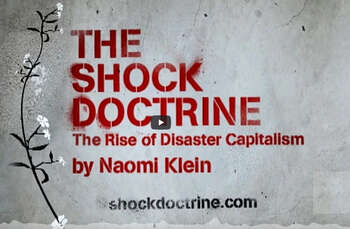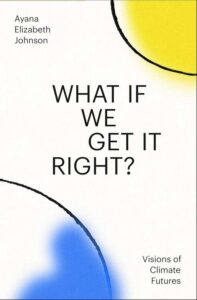This week’s selected media, May 4, 2025: Pattern Breakers, The Shock Doctrine, What If We Get It Right
This week I finished:

Pattern Breakers: Why Some Start-ups Change the Future, by Mike Maples Jr and Peter Ziebelman: I borrowed this book after hearing Mike speak about it. In parts, I felt he spoke to me about my work: starting a company can revolutionize a field, but doesn’t have to, even in Silicon Valley. Many ventures simply provide a service in a system it doesn’t change.
By contrast, some projects overturn industries. They’re different. This book doesn’t claim to say anything new in this regard. It’s helping people who do such things feel comfortable in the face of everyone disbelieving and causing friction at every turn.
They focus in for-profit ventures and mine is non-profit, so there was a cultural difference, but I’ve started for-profits so I could translate. It felt encouraging to read about common struggles of others challenging the mainstream.
The cover quote says: “The most important start-up book of the last ten years,” citing “Steve Blank, Co-creator of the Lean Startup movement.” For the culture of venture capital investment types, Blank may be right. Still, as much as they promote changing the world, there’s nothing in it about values and feeling good about what you do. They could claim a few of their examples are helping people or affecting the world in ways the founders would want to put on their grave stones. I’m sure they’d say the Lyft founders felt they improved people’s experience of being moved around relative to taxis, but the net effect of ride shares is more miles driven, congestion, pollution, depletion, and isolation. Likewise with Tesla and most of their examples. The founders got rich and made some activity more comfortable and convenient, but not more meaningful.
I’m sure some could read what I’ve written as missing the boat of the value of innovation. I’m indulging in not fleshing out what I see as neglecting values as much as I could. If anyone thinks I don’t understand, I’ll grant that I haven’t clarified as much as I could, but I’m just sharing blog thoughts here. If anyone things I’m missing something, ask and I’ll clarify.
I bring up the book’s missing values because it’s built into my book, Initiative, which I would consider the most important start-up book of the decade even if I didn’t write it. Following the Steve Blank, Lean Start Up culture tends to lead to getting rich on something the world pays for but nobody feels makes the world better.
Do you think the world is better for having Twitch, so people can stream nonstop or watch people play video games—that is, spend more time on screens and increase pollution, depletion, and addiction?
If you want to change the world with a venture, I recommend my book first. It walks you through what to do. If your venture starts changing the world, Pattern Breakers might then help.
Before the next two reviews
Before reading the next two reviews, I want to make as clear as I can that I agree with much of the understanding of the social and environmental situation that Klein and Johnson describe. I want similar results. I do not agree with their assessment of the causes, particularly in dehumanizing others and making enemies of them. In my work, I try to make clear everyone is as human as everyone else. I understand the world contains psychopaths, but psychopathy is not driving the behavior of people they see as opponents.
On the contrary, people they see as opponents want outcomes of clean air, land, water, and food, dignity and freedom for all, equal protection under the law, etc as much as they do. They see the world differently, which leads them to different strategies, but they aren’t less than human, as Klein and Johnson imply and at times outright say.

The Shock Doctrine Documentary, by Naomi Klein: After finishing influential or thought-provoking books or movies I tend to try to learn more about through interviews with their creators and following up with similar works. After finishing This Changes Everything last month, I watched a bunch of interviews and talks with Naomi Klein, which led me to her previous book and documentary The Shock Doctrine. So far I watched the documentary and watched a bunch of talks and interviews about it.
For most of my life, I would have agreed with Klein about how the rich and powerful were contriving to take from us and we should fight back. A couple quotes from this talk Klein gave about the book The Shock Doctrine before the documentary was made clarified why I found her message and actions repulsive. Other talks corroborated that feeling.
A couple of her statements that lead me to feel uncomfortable with her, and to resent that people might lump me with her since we superficially sound like we both want sustainability are that she said about people she disagrees with:
They’re motivated by greed.
and
What separates us is that we value human life.
She is dehumanizing other humans. Beyond being mean and saying things she would immediately attack others for saying their equivalents, which would be things like her opponents calling her and her allies vermin or subhuman, speaking with such lack of compassion is ineffective. It will galvanize her base, but not help them achieve the results they want, at least not if those results include peace, unity, diversity, inclusion, and equity. She’s doing what she says is wrong in others, as best I can tell she just thinks she’s right.
Have you ever met anyone who says, “I’m greedy, so I’ll do this thing based on that greed”? If she actually believes the people she opposes don’t value human life, she lacks what seems to me basic humanity and compassion. She’s dehumanizing them.
She also says
They are waging a class war.
Every warmonger always says, “I don’t want war but if attacked we will defend.” She’s warmongering and using the excuse they all do.
She makes a point of saying she visits all the shocked places. She looks like she’s portraying this being there as a virtue. She personalizes this practice.
But she looks like a dilettante: she visits and implies she represents the people shocked. I don’t think she does. She flies away to the next place. She says for the policies she opposes to win, all we have to do is nothing, meaning what we’ve been doing before. She’s doing what she warns us not to! She’s flying around racking miles on her frequent flyer account beyond anything remotely like the people she purports to help, funding the lobbyists, advertisers, politicians, and industries she claims to oppose.
I see why people call people like her “elite” as a negative term. She claims what she does doesn’t matter, yet others should change. She undermines her integrity and credibility in favor of rallying people who agree with her politics, meanwhile using the tactics she decries when people she disagrees with do them.
Is she claiming people whose policies she doesn’t like are causing the shocks? Or just taking advantage of them, because This Changes Everything is using the playbook she decries. She says things are so bad we have to do what I propose.
I want more equality, less pollution, and most of the outcomes Klein seems to want. I oppose many of the policies she opposes, but I can’t dehumanize them. I agree with many of her views and points, but I see points of Milton Friedman that make sense too, by no means all. Her elitism, her imposing values on others that she doesn’t follow herself, and her sacrificing her integrity and credibility make it hard for me to embrace what I value amid her overall message and behavior.
I’ll close with a note of solidarity. The talk I linked to closes with her saying to change things people have to work together. I agree with that bottom-up part based in democracy and basic rights for people to do what I consider signing contracts together in forming unions.

What If We Get It Right? Visions of Climate Futures, Ayana Elizabeth Johnson: I wanted to like this book but was put off before starting in meeting Johnson in person. I felt put off by her, excluded.
Nobody wants sustainability more than I do, but I think she sees me as part of the problem, not for my views but for accidents of my birth.
This book made me feel more excluded. I felt like she considered the problem something she saw inherent in choose your term: westerners, whites, Europeans, men, the global north, you know the lingo.
The biggest problem I saw was how often she came close to her or anyone doing anything sustainable themselves was how individual action was a trick by BP and no one should be made to feel guilty or shamed for their actions (except all rich or privileged people should, but somehow she’s not rich or privileged since, I guess people in the lingo above are) and that individual action doesn’t matter.
The point of living more sustainably is to live by your values! If she considers living more sustainably worse or a sacrifice, why promote it?
Polluting and depleting hurt people. I heard no evidence that she tried reducing how much she funds them or even acknowledge that she does. I would guess from the behavior she describes, she spends more money funding them than nearly any other use of funds.
By living unsustainably, not even trying to live significantly more sustainably, she funds the lobbyists, advertisers, politicians, and industries she claims to oppose. I oppose them, she funds them.
She seemed as ideological as Klein: Capitalism is the problem. Indigenous people are right. But if indigenous, black, or brown people cause problems, why not acknowledge they can cause problems too? Accidents of birth don’t make someone good or bad, contrary to Johnson’s message as I understood it; our choices and behavior in how we affect others do.
Another problem: Johnson keeps saying the projects she likes will make money, generally that a dollar spent on it will return more than a dollar later. Then do it! Make the money. At least write the business plan or something. Just saying it returns money without making billions sounds like she doesn’t believe herself.
Oh wait, I forgot my biggest problem with her proposals and vision for the future. She kept calling “clean,” “green,” and “renewable” things that pollute and deplete, like solar and wind. She calls others “deniers” for denying the science underlying our understanding of our environmental situation but doesn’t see her denial of the science showing that the technologies necessary to turn solar and wind power into electrical power are not clean, green, or renewable.
She promotes growing polluting, depleting industries in the mistaken belief they don’t pollute or deplete. Nature doesn’t respond to our beliefs or intent. It responds to our behavior.
She also keeps citing and lecturing facts and numbers as if they would change people’s behavior.
Read my weekly newsletter

On initiative, leadership, the environment, and burpees